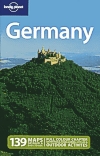GERMANY
Wittenberg Gears Up To Celebrate
500th Anniversary of
Martin Luther
Story and Photos by Tim Boxer
LTHOUGH Dr. Reiner Haseloff,
the minister-president of the federal state of Saxony-Anhalt
is Catholic, he is swept up with an abundance of enthusiasm
for the 500th anniversary of the Reformation.
Tourists flock to festivals and church services throughout
Luther Country (comprised of the states of Saxony-Anhalt and
Thuringen) during this decade of observance that began in
2008 and will climax in 2017.
It was Oct. 31, 1517, when a
resolute Augustine monk named, Martin Luther (1483-1546),
nailed his "95 Theses" on the wooden door of the Castle
Church (Schlosskirche) in the small Renaissance city of
Wittenberg, on the banks of the River Elbe.
A professor of theology at
Wittenberg University, Luther fearlessly objected what he
perceived as false teachings of the Roman church, especially
the requirement of dropping coins into the priest’s treasure
chest to obtain letters of indulgences absolving them of
sin.
In Wittenberg, Luther preached
against this idea of buying your way out of sin, among other
abuses of the Roman Catholic Church. By thus triggering the
Protestant Reformation, Luther shook the power of the Pope
and revolutionized Christian faith.
 Resources Along with our affable guide, Bettina, we referred constantly to
Lonely Planet: Germany to guide us around, especially in Lutherstadt Wittenberg, and other destinations in LutherCountry. This is an excellent companion for your journey. Lonely Planet, soft cover, 828 pages, $27.99. Currently priced at $19.59 at
shop.lonelyplanet.com Resources Along with our affable guide, Bettina, we referred constantly to
Lonely Planet: Germany to guide us around, especially in Lutherstadt Wittenberg, and other destinations in LutherCountry. This is an excellent companion for your journey. Lonely Planet, soft cover, 828 pages, $27.99. Currently priced at $19.59 at
shop.lonelyplanet.com |
Luther wrote many hymns in German,
which was quite a novel idea at a time when Latin was the
language of ritual. He translated the Bible from the Greek,
Latin and Hebrew into Higher German to enable the common
people to read it for themselves. That was a radical idea.
Until then only the clergy were learned, able to read.
Luther gave power to the people.
At a press luncheon at the city’s
Best Western Stadpalais, the Minister-President of
Saxony-Anhalt, which was part of East Germany during the
Cold War, said there were 25,000 Russian soldiers stationed
in Wittenberg. Outside the city there were nuclear missiles.
Dr. Reiner Haselof is thankfully
relieved he doesn’t face such issues today. He is focused on
tourism and investment. Next May he will head to the U.S. to
tour the Bible Belt and the west coast to drum up business
for his state.
Dr. Haselof said Wittenberg
counted 200 Jews during the Nazi era. Seven survived. After
the fall of the wall, 3,000 Jews came here from Russia.
"Because of our history," Dr.
Haselof said, "we must support Israel. "It’s the only
democracy in the Middle East. I will go to Israel next
October as a political signal, as support for them and for
economic reasons."
Israeli firms are already active
in his state, especially in the area of security. "They have
a chemical factory here, and an alcohol business. They make
kosher vodka in Magdeburg, which is sold in Europe and the
United States."
The Chinese, he said, are here
too, with the first green investments in Europe. They’ve
invested in packaging for food and machine construction.
Unlike elsewhere in Germany, there
are no Turks in this state, not a single mosque. But many
Vietnamese have settled here. "They are very well
integrated," Dr. Haselof said. "Their children are the best
in school."
After the country’s reunion,
unemployment was rampant in the ‘90s. Many people migrated
west. The question of the future, Dr. Haselof said, is how
to attract young people to return to this part of eastern
Germany.
While he’s working on it, you will
be well advised to start planning your trip to Lutherstadt
Wittenberg in 2017 to partake of the many activities
celebrating the 500th anniversary of the
Reformation. Get information at
www.saxony-anhalt-tourism.eu.